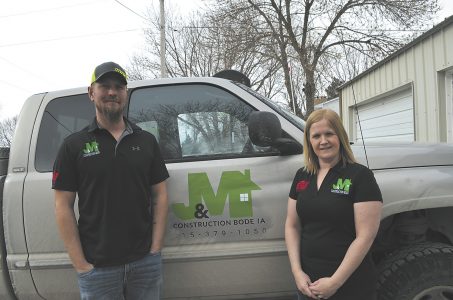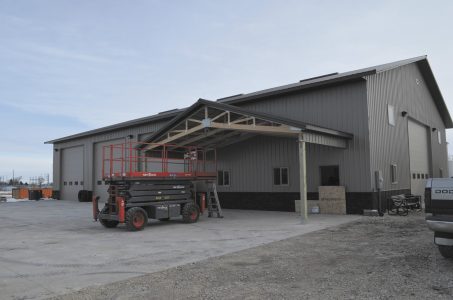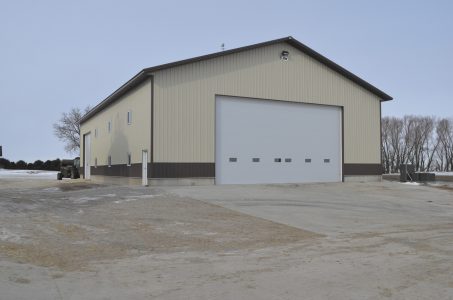J&M Construction: It’s quality that counts
Small construction company works to compete against larger contractors; Warnke: ‘We only have plans to grow’
-
-Photo by Kriss Nelson
James Warnke and Megan Phillips are the owners of J&M Construction located in Bode. They specialize in agricultural and commercial construction and are an EPS Building dealer.
-
-Photo by Kriss Nelson
J&M Construction finished construction on this building earlier this month. This particular building, located in Emmetsburg, will be used as a shop for a local trucking company.
-
-Photo by Kriss Nelson
This is another structure built by J&M Construction. Located near Mallard, this building is used by a farmer for his machine shop.
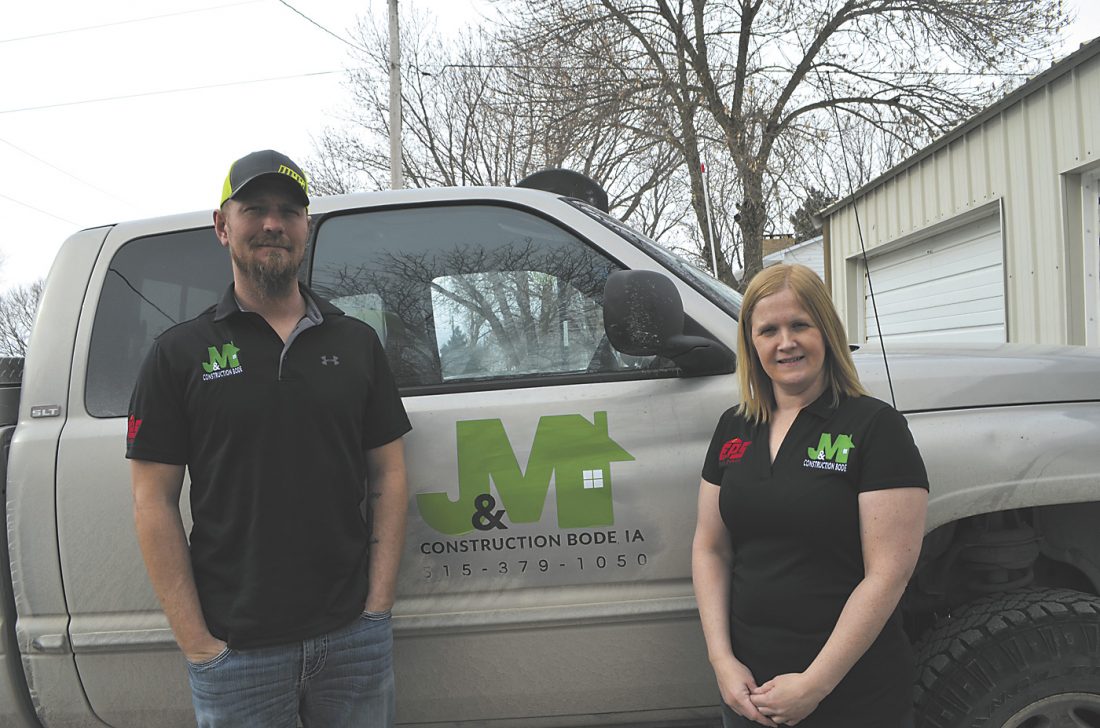
-Photo by Kriss Nelson
James Warnke and Megan Phillips are the owners of J&M Construction located in Bode. They specialize in agricultural and commercial construction and are an EPS Building dealer.
BODE — It has been a whirlwind of growth for J&M Construction since their start just a short three years ago.
The Bode area company, which is owned by James Warnke and Megan Phillips, specializes in agricultural and commercial builds. But that hasn’t always been their niche.
“We started off small, doing odds and ends, roofing, siding, windows, and now it’s exploded into what it is now,” said Warnke. “The smaller jobs were a good starting point to get our name out and show the quality of work. Now we are on to the bigger stuff, continuing to show we do quality work and we are here to stay. We’re not going anywhere.”
Warnke said he decided to start his own construction company after a stint working a job in Humboldt. He felt it was time, with the experience he had behind him, to make the change.
“I was tired of working inside. I have a construction background. Construction is in my family. I had worked for my dad and my uncle,” he said. “Working with them I learned a bulk of the knowledge that I have, and I was previously a foreman for another construction company. I have been in the construction field off and on since I was 16. That’s 20 years now.”
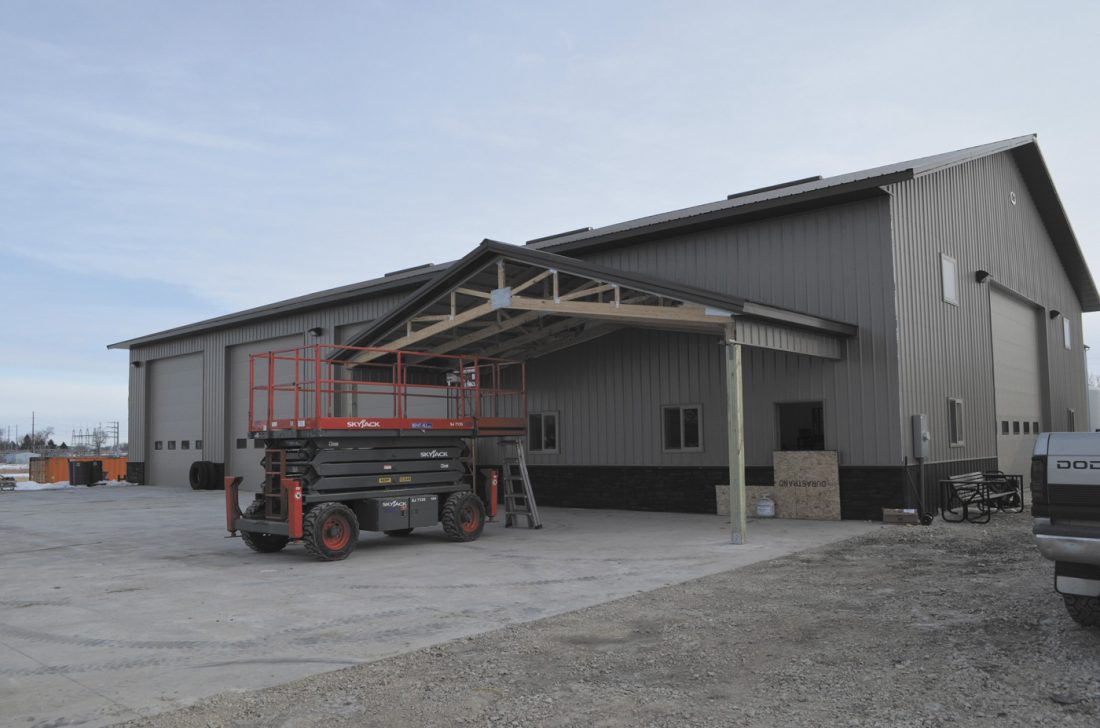
-Photo by Kriss Nelson
J&M Construction finished construction on this building earlier this month. This particular building, located in Emmetsburg, will be used as a shop for a local trucking company.
Warnke said J&M Construction specializes in commercial and agricultural buildings and became an EPS (Energy Panel Structures) Building dealer about a year ago.
Warnke said he has previous experience with building EPS structures.
“He knows their product,” said Phillips.
About EPS
According to EPS, they were established in 1981 as a wholly owned subsidiary of the MacArthur Company of St. Paul, Minnesota.
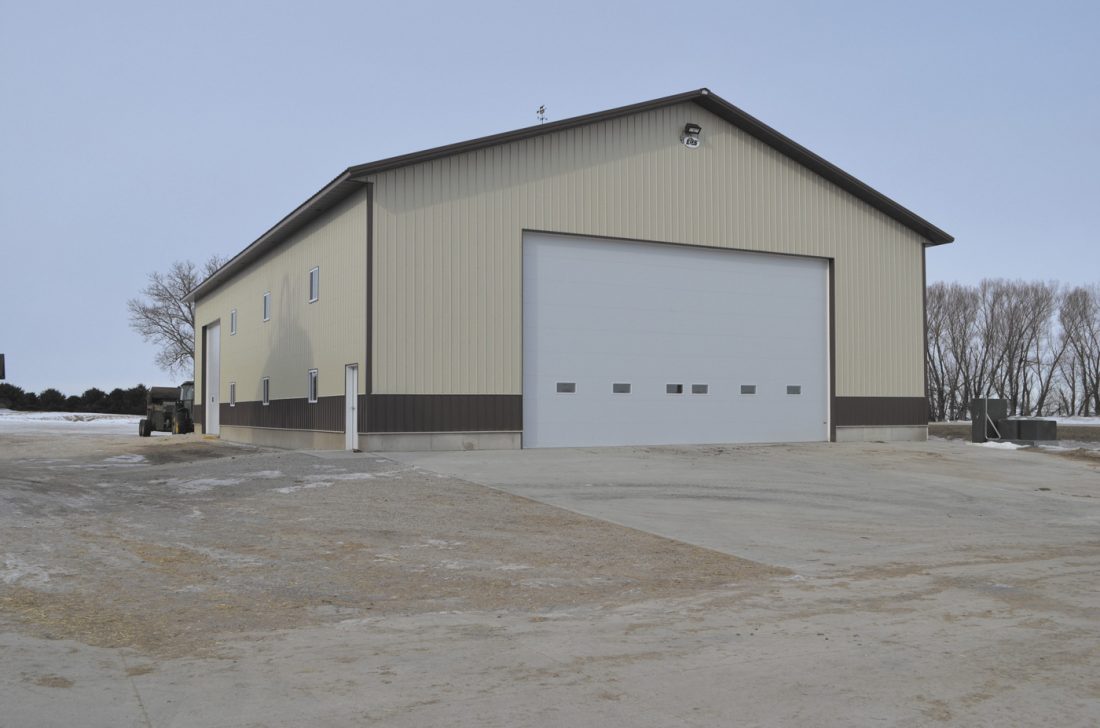
-Photo by Kriss Nelson
This is another structure built by J&M Construction. Located near Mallard, this building is used by a farmer for his machine shop.
MacArthur Company, was established in 1913 as a small manufacturer of pipe insulation and is a private firm with a 4A1 Dun & Bradstreet rating. They are now the No. 1 choice for virtually all insulations and accessories, from pipes to HVAC to roofing products with 20 warehouses throughout the western United States.
Energy Panel Structures was started in Albert Lea, Minnesota. After three expansions, the company moved in 1988 to Graettinger to a new 40,000-square-foot plant designed specifically for the manufacture of insulated panels. Since the move to Graettinger, EPS has expanded three times, adding 3,000 square feet for a door manufacturing facility and another 7,000 square feet to increase the finished goods storage capacity. Its latest expansion of 30,000 square feet to the main manufacturing space brings the total facility to 110,000 square feet on an 8-acre tract.
In 2010, EPS purchased a manufacturing facility in Perryville, Missouri. Along with the manufacturing capability, this location boasts additional engineering and sales support for EPS and its dealers.
The EPS family expanded again in 2013 with the purchase of a manufacturing facility located in Clyde, New York. This location specializes in supply post-frame and structural insulated panel buildings to customers located on the east coast.
EPS is 100 percent employee-owned and 100 percent quality committed.
Benefits of EPS buildings
EPS offers a build called a SIP — structure insulated panel.
“They are energy efficient,” said Phillips.
“Other building companies do not offer that style of building,” said Warnke. “They are more efficient for energy in the long run, and are a faster and simpler way to build.”
According to EPS, they originally began to manufacture insulated wall panels for the agricultural market.
Since that time, EPS has diversified into the commercial/industrial markets including:
• Structural insulated panel (Solid Core) buildings feature foam core wall panels and wood truss systems for small- and medium-size agricultural, commercial and industrial buildings
• Post frame packages for commercial and agricultural use.
• Commercial industrial building packages and panelized products.
• Complete dairy facilities.
• Equestrian arenas and complete stable packages.
• Steel-frame building packages can use Energy-Lok steel faced EPS foam core panels.
• Insulated panels for both new construction and retrofit projects.
• Small exterior cooler and freezer building packages.
• New homes for single- and multi-family living.
• Cold storage panel systems and walk-in freezers.
With the main focus being on agricultural and commercial construction, and having stepped away from residential work, Warnke said to not dismiss the idea for a “SHOUSE.”
EPS defines an SHOUSE as a shop plus a house.
According to the company, the flexibility of EPS building packages means it’s easy to build for your unique lifestyle. For superior comfort and energy efficiency, combine a house with a shop or storage area built using SIPs. Or, combine a SIP-built home with a post-frame shop storage area.
Regardless of the combination you select, your home and shop package will be engineered to fit together in one complete building package.
“We offer one of the best SHOUSE packages on the market for energy efficiency and quality of build,” said Warnke.
Otherwise, Warnke said they have been building shops, machines, livestock barns, and a few structures just recently for a trucking company.
“We basically build anything to pertain within agricultural and commercial settings is what we are up for. We also specialize in doing concrete work as well,” he said.
As far as sizes of agricultural or commercial buildings, the possibilities are practically endless.
“The sky’s the limit,” said Warnke. “We are up for building any size from small to big.”
When constructing a building, Warnke said they act as the general contractor for the entire build.
“We line up the plumbers. We have electricians that we work with also. We’re not just the building company. We are a full-service builder. We offer the whole thing,” he said. “You don’t have multiple contractors, and that is a big benefit. When you have your ducks in a row, it works out easier.”
J&M currently has three fulltime employees and in the busy building season will bring in an additional three to four employees.
Can a small company from a small town compete with larger construction companies?
“Definitely,” said Warnke. “Don’t count us for being a small, young company. We’re here to stay, and we are going to give the bigger construction companies in the area a run for their money.”
Warnke said he can do this by keeping his overhead small and bringing a more personal factor to his customers.
“There’s a face-to-face contact with us,” he said. “Also, when you get into larger construction companies, their labor rates are a lot higher. We can offer a more affordable labor and still bring a quality product to the market.”
J&M Construction may not remain that small of a company for long.
“We only have plans to grow,” he said. “My five- to 10-year goal is to have 20 full-time employees and run multiple crews.”

